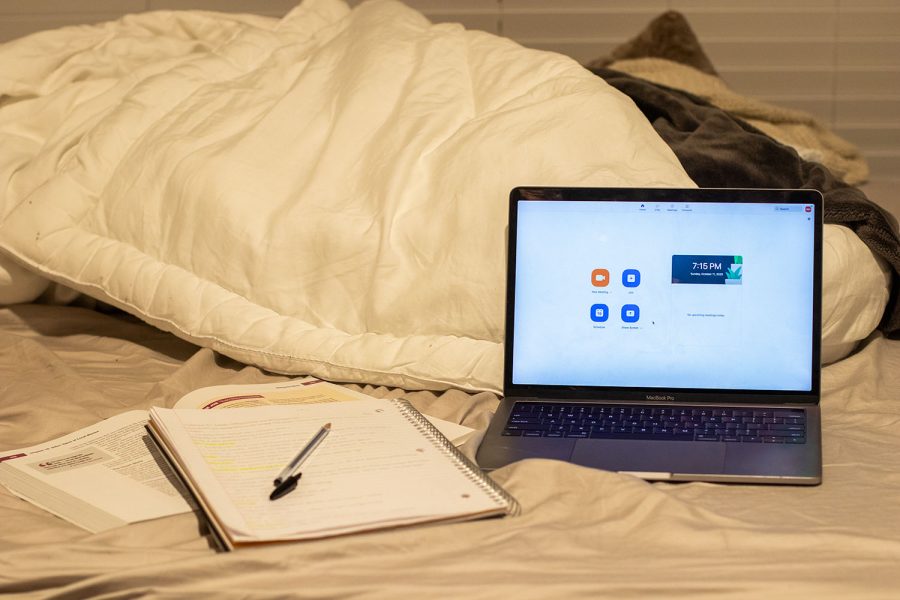Guest Opinion | Online proctoring is garbage
With remote classes, some professors have turned to online proctoring programs to ensure the legitimacy of test-taking — which is detrimental to everyone involved.
Photo Illustration by Kate Heston
November 30, 2020
Gone are the days of the typical turn-your-caps-backward, phones-in-the-tub in-person testing. Now, instead of TAs pacing the aisles, we may have finally gotten the Big Brother we were promised. If you go to the University of Iowa, you probably are familiar with two of them: Proctorio and Respondus Lockdown Browser.
If you’ve never taken a test with one of these programs, the best way I can think to describe it is all of the stress of MacGyver without any of the coolness. After the program warns you that your eye and mouth movements will be monitored, you are required to scan your surroundings. During the test, as your computer fan hums with discontent in response to the demanding size of the software, you are alerted whenever your face turns away from the screen or perhaps booted from the program entirely. And in some classes, you are told that if you have any tech issues to contact–not your professors–but the third-party service itself.
All of these services, but Proctorio in particular, have been facing a wave of backlashes recently from students and faculty who are concerned about forcing students to download and use these programs—which techies and administrators themselves have called spyware. A recent Washington Post article reported on students’ experiences with these programs, from one student who literally peed in a pot on camera because they were not allowed to leave the room to others whose darker skin tones the software did not recognize. This is to say nothing of the other inequities embedded in this testing model (such as the assumption that students will have a quiet, independent space to take the test), ambiguities around the collection of personal data (not to mention a security breach this past summer), and the emotional toll this is taking on students.
Importantly, these are not mere kinks in the system and this is not a problem that requires better, faster, fitter exam proctoring services. Glitches are signals for how the system operates, for whom it operates, and to what ends. There are consequences to forcing tech answers to political questions. What do we want a University to be for? and are these programs in service of those goals?
Some universities, like the University of California Berkeley and McGill University in Canada, have banned online exam proctoring altogether and at other universities, students are petitioning for their colleges to do the same. There are alternatives to online exam proctoring, explained all over the internet but also in a guide released by the University of Iowa.
If you are a teacher, I would urge you to consider three things: First, please consider asking your students if they would prefer an alternative to online proctored exams. Second, I would ask you to think about the implications of pressuring students, whom you have a degree of power over and many of whom are really struggling right now, to download invasive, widely controversial surveilling technologies on their personal computers. Have you ever taken a high-stakes test using one of these programs? Lastly: What does it mean for the student-instructor relationship to assume antagonism, to assume malevolence from your tired students who are weathering this pandemic-recession no better than you are? What is a university for? and is this part of it?
And if you are a student concerned about this issue, I would urge you to contact your professors and ask them to grapple with these things too.
If a pandemic, recession, etc. has us in the mood to step back and really look at what we are doing, it might be worth reconsidering what we want education to be and if what we’re doing comports with that vision. If our curriculum is made up of adversarial didactic relationships and surveilling technologies, what does that mean for the kind of learning we do?
—Hannah Zadeh, University of Iowa Junior



